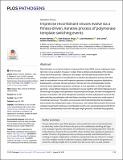Imprecise recombinant viruses evolve via a fitness-driven, iterative process of polymerase template-switching events
Abstract
Viruses with positive-sense RNA genomes, such as poliovirus, have several mechanisms by which they evolve. One of these is the process of recombination involving the large-scale exchange of genetic information. Recombination occurs during replication when the viral polymerase, bound to the nascent RNA chain, switches from copying one genome to another. However, the polymerase does not always accurately switch between the two, resulting in sequence duplications or deletions, and genomes that are referred to as imprecise. Over multiple rounds of replication sequence duplications are lost and genomes are resolved to wild type length, but it is unclear how this occurs. Here we used synthetic polioviruses containing defined sequence duplications to determine that the genome population undergoes repeated rounds of recombination until sequence duplications are lost and viruses with precise, wild type length genomes are selected for. This selection is based on the overall fitness of the virus population, with less fit imprecise viruses evolving more quickly. Our study suggests that recombination is a continual process where virus fitness drives the selection of a small subset of recombinant variants. These data are important for understanding how novel viruses evolve via recombination and how this process can be blocked to prevent novel and dangerous pathogens from arising.
Citation
Bentley , K , Alnaji , F G , Woodford , L , Jones , S , Woodman , A & Evans , D J 2021 , ' Imprecise recombinant viruses evolve via a fitness-driven, iterative process of polymerase template-switching events ' , PLoS Pathogens , vol. 17 , no. 8 , e1009676 . https://doi.org/10.1371/journal.ppat.1009676
Publication
PLoS Pathogens
Status
Peer reviewed
ISSN
1553-7366Type
Journal article
Description
Funding: This work was supported by the Biotechnology and Biological Sciences Research Council - https://bbsrc.ukri.org/ - (BB/M009343/1 to D.J.E) and an ISSF award from The Wellcome Trust - https://wellcome.org/ - to the BSRC, University of St Andrews. F.G.A was supported by a PhD studentship from the Ministry of Education, Government of Saudi Arabia. S.J was supported by a Microbiology Society - https://microbiologysociety.org/ - Harry Smith Vacation Studentship awarded to K.B.Collections
Items in the St Andrews Research Repository are protected by copyright, with all rights reserved, unless otherwise indicated.

